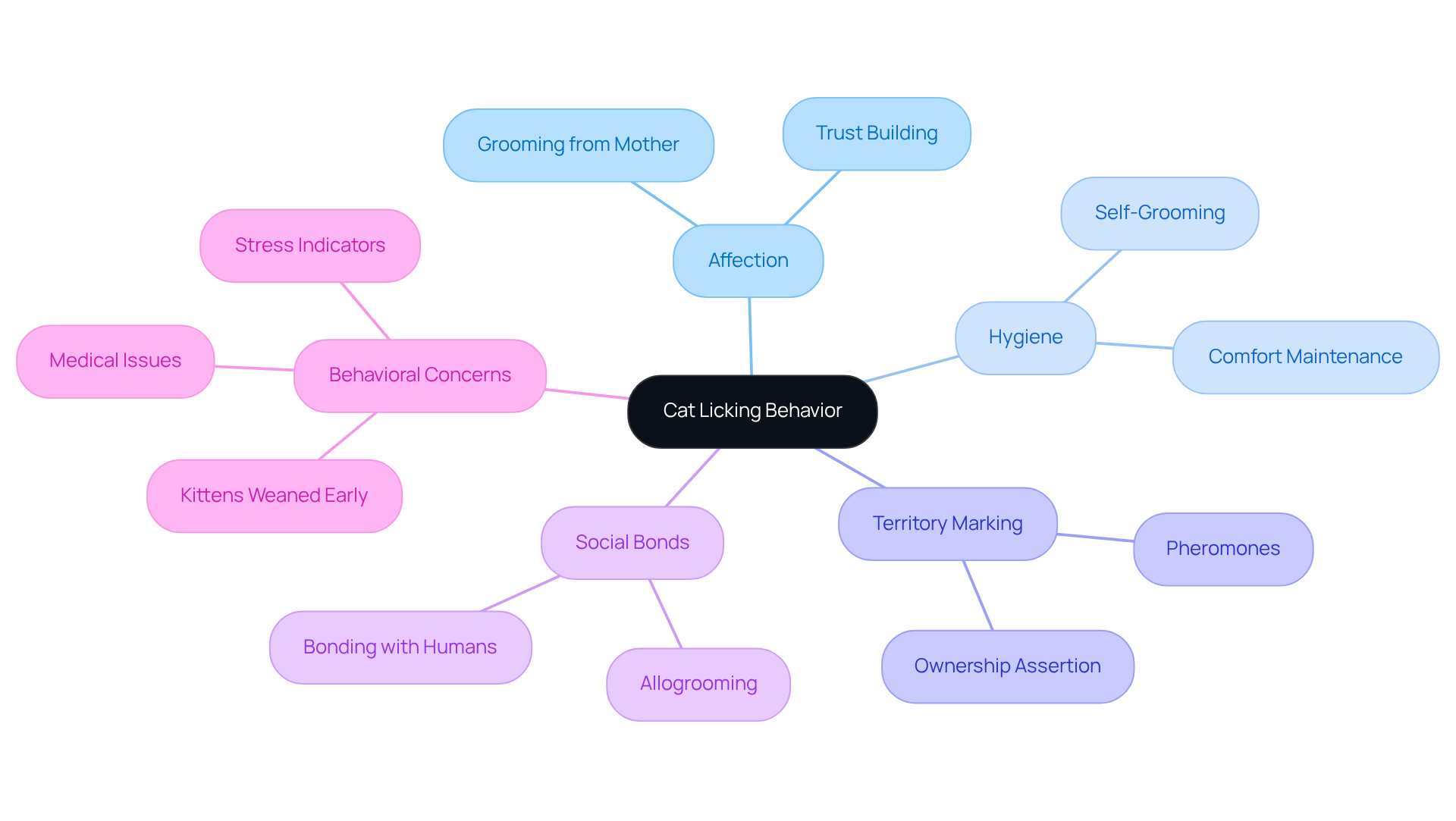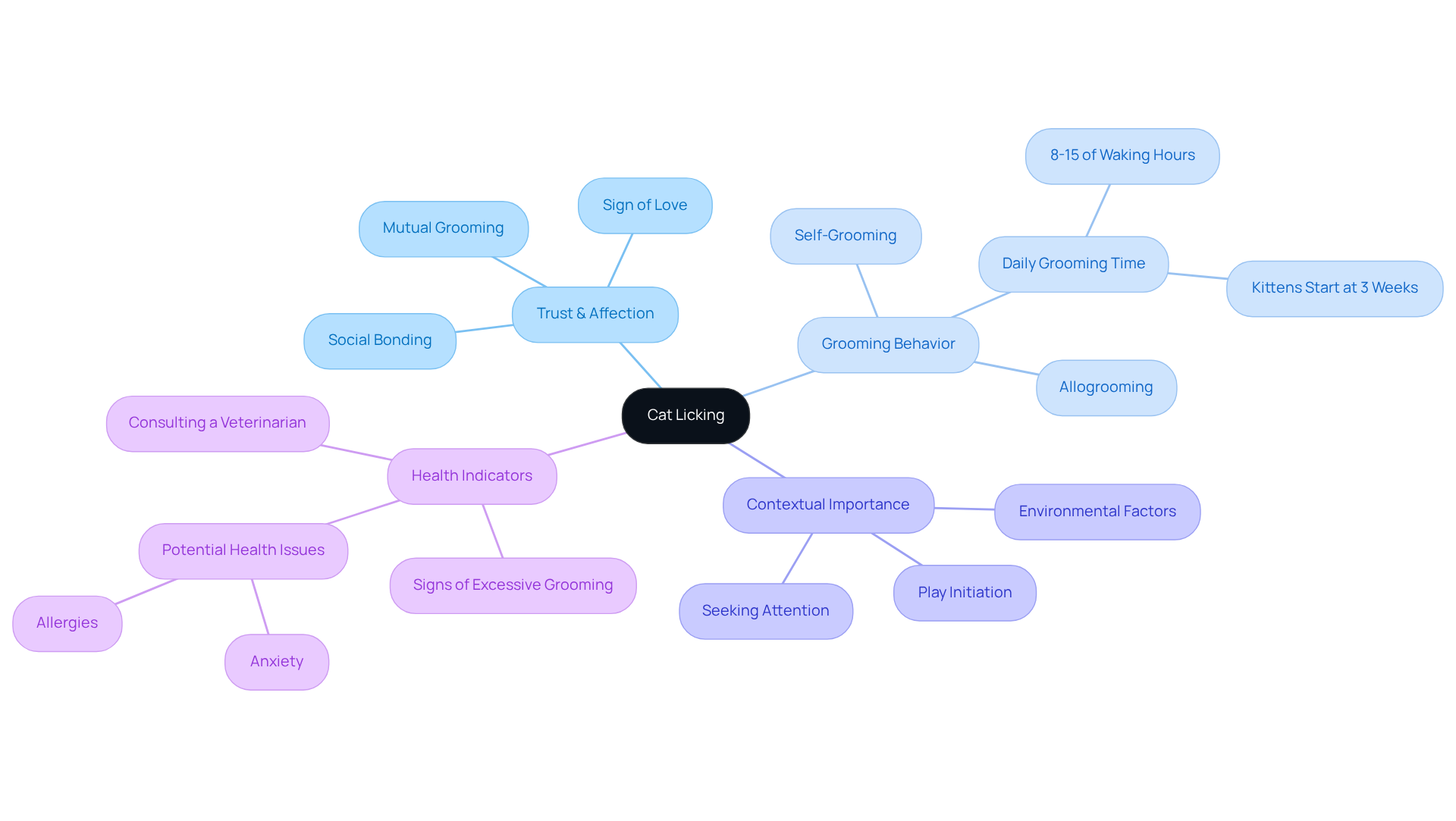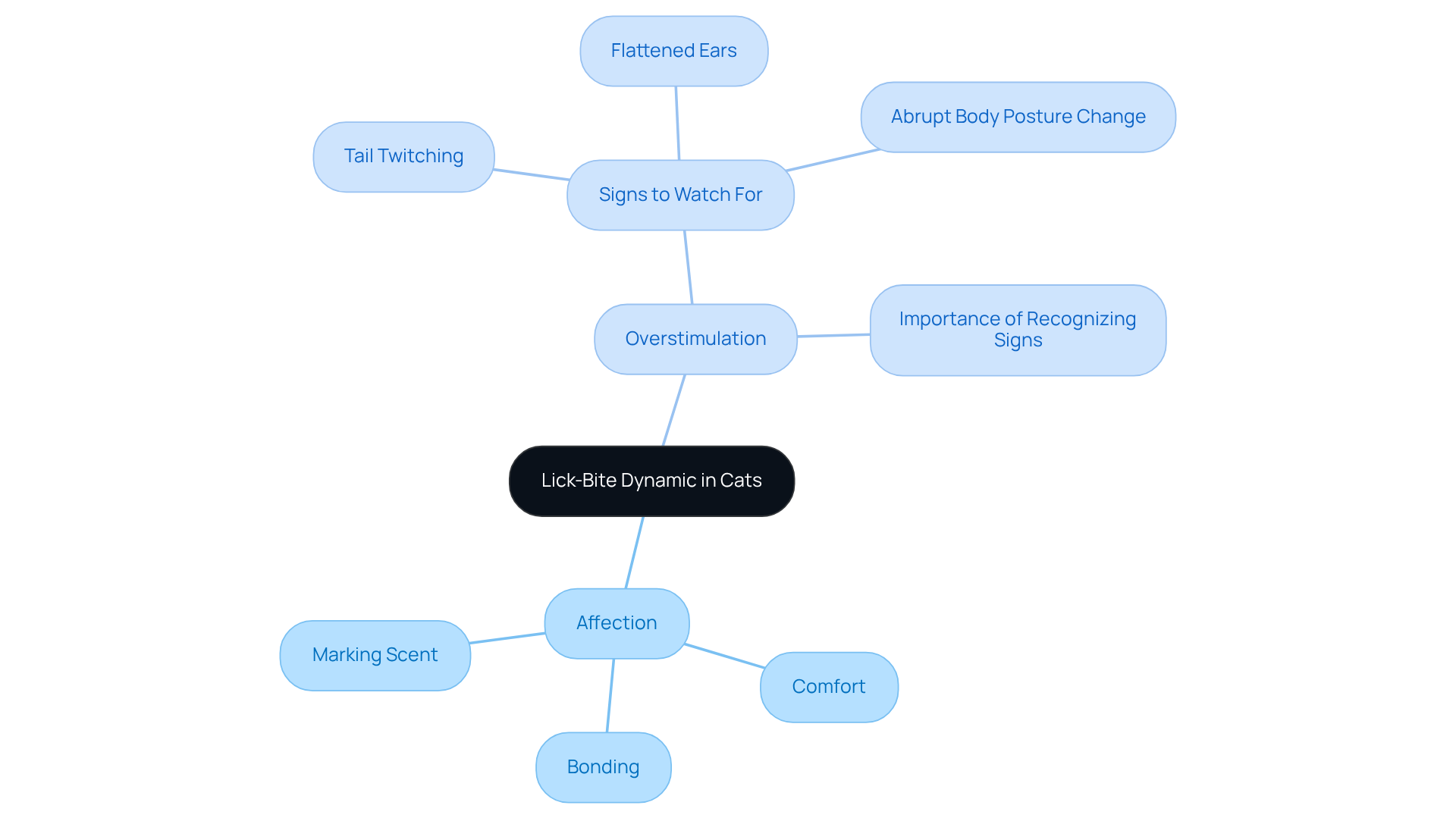
Why Do Cats Lick You? Understanding Feline Affection and Behavior
Overview
Cats lick you primarily to express their affection and reinforce social bonds, a behavior they learn from their mothers during grooming. This gentle act serves as a heartfelt form of communication, indicating trust and comfort between you and your feline companion. However, it’s essential to be mindful that excessive licking may signal underlying stress or health issues. Understanding this behavior is crucial for nurturing a positive relationship with your beloved pet, as it allows you to respond compassionately to their needs.
Introduction
Cats have a truly unique way of expressing their affection, and one of the most endearing behaviors they exhibit is licking. This instinctual action, learned from their mothers during kittenhood, serves as a vital form of communication and bonding. As pet owners explore the reasons behind this behavior, they may uncover the layers of feline affection, grooming, and even territorial marking that contribute to why cats lick their humans.
Yet, the intrigue deepens when considering the complexities of the lick-bite dynamic—what begins as a loving gesture can sometimes signal overstimulation. What do these behaviors truly mean? Understanding them can enhance the bond between cats and their caregivers, fostering a deeper connection that nurtures both the pet and the owner.
Understanding the Reasons Behind Cat Licking Behavior
There are various reasons why cats lick you, deeply rooted in their instincts and social interactions. It’s heartwarming to recognize that a primary motivation, which leads us to wonder why cats lick you, is to express affection, a practice learned from their mothers who groom their kittens from birth, fostering a bond of trust and care. As our beloved felines mature, they continue to embrace this instinct in their interactions with us, leading us to wonder why cats lick you as a way to convey affection and acceptance. This behavior reflects allogrooming, where cats groom one another, strengthening social bonds and trust within their community.
Moreover, the act of grooming is essential for preserving hygiene and comfort. It’s important to understand that cats may also lick to mark their territory; their saliva contains pheromones that signal ownership. By comprehending these motivations, we can interpret our cats’ behaviors more precisely, including understanding why cats lick you, ultimately improving the bond we share with them. However, if you notice excessive grooming, it could signify stress or anxiety. It’s crucial to consult a veterinarian if this behavior occurs suddenly or frequently, as it may indicate underlying issues.
Kittens weaned too early may also display excessive grooming as a substitute for the oral stimulation they missed. By understanding the subtleties of licking actions, we can more effectively meet our feline companions’ needs, nurturing a positive and loving connection. Remember, your awareness and care can make a significant difference in your pet’s well-being, fostering a relationship built on trust and affection.

Exploring Affection, Grooming, and Communication in Cat Licking
Licking is not merely a grooming activity; it serves as a vital form of communication among our beloved felines. When a cat licks another cat or a human, it signifies trust and affection, prompting the question of why do cats lick you. This behavior, known as allogrooming, is prevalent among felines that share a close bond, reinforcing social structures and relationships within their group. As Randa Kriss insightfully notes, ‘Licking doesn’t merely serve the purpose of grooming; it is also a means for felines to express their affection for you, which leads us to wonder why do cats lick you?’
Moreover, grooming can be a way for cats to seek attention or initiate play. For instance, a cat may lick its owner to signal why do cats lick you, as it longs for some petting or wishes to engage in interactive play. Understanding the context in which licking occurs is crucial, as it can vary greatly depending on the cat’s mood and environment. Research suggests that healthy cats dedicate 8 to 15 percent of their waking hours to grooming, underscoring its importance in their daily lives. Kittens begin to clean themselves at around 3 weeks old, marking the start of this essential habit.
By recognizing these behaviors, pet guardians can deepen their bond with their feline companions and respond appropriately to their needs. It’s also important to remain vigilant for signs of excessive grooming, as this may indicate underlying health issues. This holistic approach to pet care ensures that we are attuned to our pets’ emotional and physical well-being, fostering a nurturing environment for them to thrive.

Interpreting the Lick-Bite Dynamic: Affection or Overstimulation?
The lick-bite dynamic in cats can often leave pet caregivers feeling puzzled and concerned. You might be curious about why do cats lick you affectionately, only to follow up with a gentle bite. This behavior can signify multiple things, which raises the question of why do cats lick you. Typically, the initial licking indicates affection, which raises the question: why do cats lick you, while the subsequent bite may suggest that your cat is feeling overstimulated or is trying to establish boundaries. Each cat has its own threshold for physical interaction; what begins as a loving gesture can quickly become overwhelming for them.
Identifying signs of overstimulation—such as tail twitching, flattened ears, or an abrupt change in body posture—can help you assess when your cat has reached its limit. Understanding these signals is crucial for nurturing a harmonious connection, allowing you to balance your cat’s needs with your own affection. Research shows that overstimulation is the most common reason for a cat to hiss, and prolonged petting can often trigger this response. By paying close attention to your cat’s body language, you can enhance your interactions and create a positive experience for both of you. Remember, your cat relies on you to understand their feelings, and being attuned to their needs fosters a deeper bond between you.

Conclusion
The intricate behavior of cats licking their owners serves as a profound expression of their affection and trust. This instinctual action, rooted in their early experiences with their mothers, highlights the special bond that develops between humans and felines. Understanding why cats lick you not only deepens this relationship but also fosters a greater appreciation for the social dynamics at play in feline behavior.
Throughout this exploration, key insights reveal that licking is a multifaceted behavior encompassing grooming, communication, and even territorial marking. It’s essential to recognize the context of licking, as it can signify anything from a desire for attention to a way of establishing boundaries through the lick-bite dynamic. Moreover, being aware of excessive grooming behaviors can help identify potential stress or health issues, underscoring the importance of attentive and compassionate pet care.
Ultimately, nurturing a loving and respectful relationship with a cat involves understanding their unique behaviors and needs. By being observant and responsive to their signals, caregivers can enrich their bond with their feline companions. Embrace the nuances of cat licking behavior and take action to create a nurturing environment, reinforcing the significance of trust and affection in the human-animal connection.
